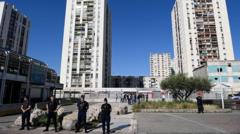The 2023 Pride march in Budapest is gearing up for a historic turnout as the LGBTQ community and allies stand firm against the pressures from conservative politicians and police.
Hungary's Pride March Defies Government's Legal Threats

Hungary's Pride March Defies Government's Legal Threats
A Budapest Pride event is set to proceed this weekend despite Prime Minister Orban's warnings of legal action against LGBTQ activists.
In a defiant stand against intimidation, Budapest's Pride march is scheduled for Saturday, taking place despite Prime Minister Viktor Orban's stern warnings of potential legal consequences. Organisers are anticipating an unprecedented turnout this year, fueled by the ongoing struggle for LGBTQ rights amidst an increasingly hostile political environment.
The government recently introduced a "child protection" law, leading police to issue a ban on gatherings deemed to promote homosexuality. Just a day prior to the event, Orban sought to minimize fears of violence, asserting that while legal repercussions exist for attendees, "Hungary is a civilised country," with no intent to cause physical harm. He indicated that participants could face fines of up to €500 ($586), while identities could be tracked using facial recognition software. The risks extend to organisers as well, who may face a year in prison.
European Commission Equalities Commissioner Hadja Lahbib has arrived in Budapest and is expected to participate in the event, supported by numerous Members of the European Parliament (MEPs). Lahbib shared her solidarity on social media, stating that the march represents "the strength of civil society."
Meanwhile, European Commission President Ursula von der Leyen has urged the Orban administration to allow the march to proceed uncontested, but Orban responded firmly, advising her to avoid interference in the judicial matters of EU members. With tensions high, the Pride march is set to be a pivotal moment for LGBTQ activists in Hungary.
The government recently introduced a "child protection" law, leading police to issue a ban on gatherings deemed to promote homosexuality. Just a day prior to the event, Orban sought to minimize fears of violence, asserting that while legal repercussions exist for attendees, "Hungary is a civilised country," with no intent to cause physical harm. He indicated that participants could face fines of up to €500 ($586), while identities could be tracked using facial recognition software. The risks extend to organisers as well, who may face a year in prison.
European Commission Equalities Commissioner Hadja Lahbib has arrived in Budapest and is expected to participate in the event, supported by numerous Members of the European Parliament (MEPs). Lahbib shared her solidarity on social media, stating that the march represents "the strength of civil society."
Meanwhile, European Commission President Ursula von der Leyen has urged the Orban administration to allow the march to proceed uncontested, but Orban responded firmly, advising her to avoid interference in the judicial matters of EU members. With tensions high, the Pride march is set to be a pivotal moment for LGBTQ activists in Hungary.



















